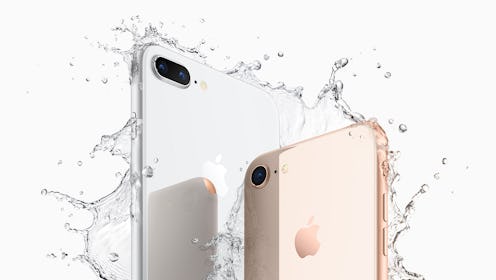
During the first-ever launch event at the Steve Jobs Theater on its new campus, Apple revealed its much-anticipated new iPhone series: the iPhone 8, iPhone 8 Plus, and iPhone X. Following the launch of the iPhone 8 series, many people are likely contemplating buying the newest iPhone model and want to know more information about its features, including whether or not the iPhone 8 is waterproof.
For iPhone users who place high value on having a water-resistant phone, the new iPhone model could be ideal. Although rumored to come with a high water resistance rating of IP68 — which only the Samsung Galaxy S7 has at the moment — the iPhones 8, 8 Plus, and X were ultimately released with a IP67 rating.
A water resistance rating of IP68 means that a phone can be submerged underwater for up to 30 minutes at a depth of up to 1.5 meters (or around 4.9 feet) and still function. Apple has never before had a device with an IP68 rating.
The previous iPhone model, the iPhone 7 line, constituted the first iPhone product line to feature any type of water or dust-proofing. The iPhone 8's IP67 rating means means that it should maintain functionality even after 30 minutes underwater at a depth of up to 1 meter (3.3 feet). So the main difference between an IP67 and an IP68 rating is the water depth at which a phone should still be able to function — not how long it's underwater for.
The iPhone 7's water resistance capabilities were proven quite effective, as many technology media outlets conducted water resistance tests following the release of the model. For example, CNET subjected the iPhone 7 to four rigorous "dunk" tests back in September of last year.
CNET submerged the phone in 3.3 feet of water for 30 minutes, at the reported absolute maximum of its water resistance capabilities. It also used the phone for underwater photography, put the phone in 6.5 feet of water for 30 seconds, and had someone swim 10 laps in the pool with the phone.
Impressively, following all of these water tests, the phone was still functioning. And, moreover, after letting the phone dry overnight, the only indication that it had spent prolonged periods underwater seemed to be in the speakers, which sounded a bit muffled at high frequencies. However, the screen, buttons, and microphone of the iPhone 7 all seemed to work normally.
Of course, in this case, CNET exposed the iPhone 7 to extreme water activities. Most people do not intentionally place their phones in water and instead are most likely to splash their phones or quickly drop their phones in shallow liquid and retrieve them. Thus, this water resistance rating seemed to be quite sufficient for the everyday smartphone user.
That being said, it is still important to take precautions. Water resistance is not a foul-proof guarantee that your phone will work after exposure to water, so you should never intentionally expose it to liquids. Moreover, if your iPhone is exposed to water and does stop working, Apple will not cover the costs of repairing the device. The company's website pointedly notes that any liquid damage is not covered by the company's one-year limited warranty or an AppleCare Protection Plan (APP). It also points out that Apple technicians can tell whether a product has been water damaged by observing a Liquid Contact Indicator (LCI) that is built into the device. LCIs turn red when an electronic device has come into contact with liquid.
Overall, while the iPhone 8 may not be waterproof, it will be splash, water and dust resistant. "Splash, water and dust resistance are not permanent conditions, and resistance might decrease as a result of normal wear," the press release noted.